Top Stories
As a Toronto Mob Brays, David Frum and Steve Bannon Joust over Populism’s Split Soul
Is populism a polite synonym for xenophobia—or a righteous movement to wrest power from elites?
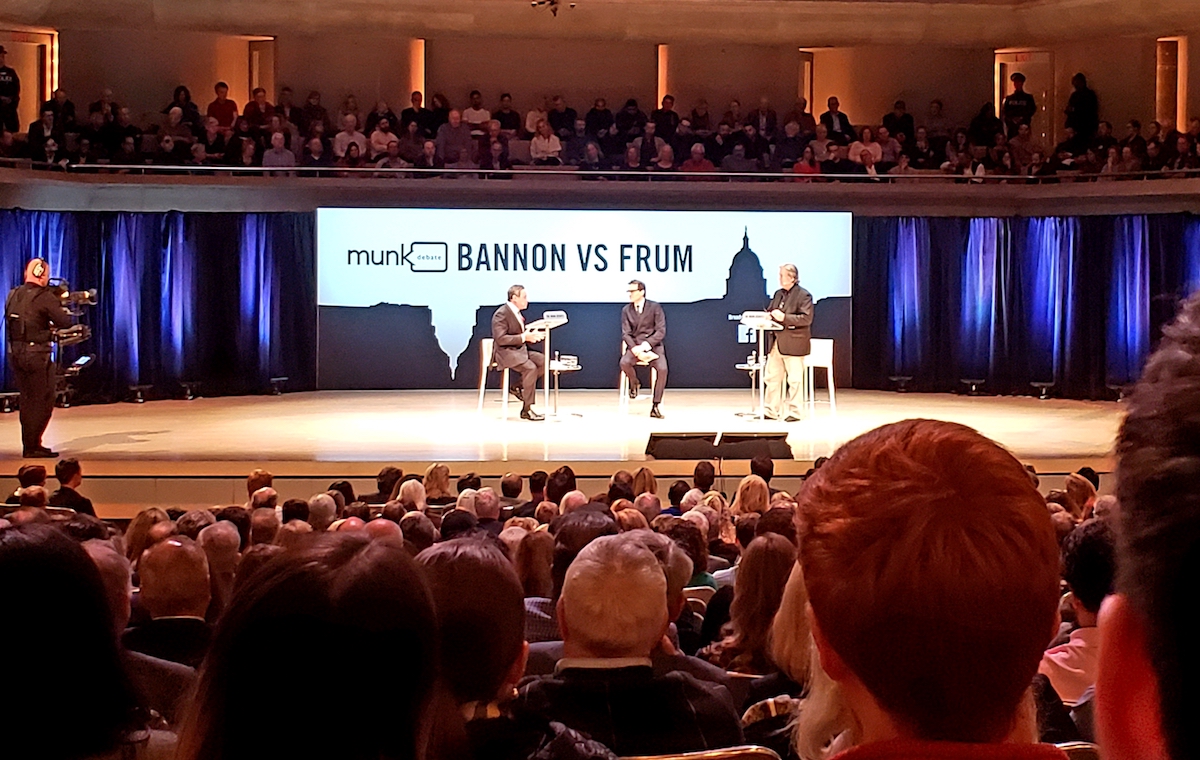
It’s always gratifying when real life actors conspire to validate claims that an author makes in the abstract realm. Thus did I experience a blush of pundit’s pride upon observing the protestors who assembled in downtown Toronto in advance of Steve Bannon’s Munk Debate with David Frum on Friday night. Just days before, I had noted progressives’ now-epidemic habit of labeling everyone they dislike as a—real, not figurative—Nazi. And now, just days later, here I was, in a security line outside Roy Thomson Hall, surrounded by hundreds of protestors declaring Bannon to be a Nazi, and we audience members to be on moral par with Hitler’s followers. Some of the placards betrayed signs of haste—including signs held up by a couple that read, “Fuck You Nazis,” and “Nazis, Get Fucked,” on matching sides of a grease-stained pizza box. But the sentiment came through loud and clear: It’s 1933. Which side are you on?

Fortunately, the scene inside the debate hall—where 2,800 audience members had assembled to see Frum and Bannon debate the resolution, “The future of western politics is populist not liberal”—did not quite align with the Nazi Party Congress. The Nazis took a decidedly uncharitable view toward dissidents and hecklers. But when two protestors interrupted the debate by unfurling banners from balconies and (in one case) loudly denouncing us as racists, they received polite applause for their moxie. Indeed, moderator Rudyard Griffiths informed the first that she was welcome to stay, banner and all, if she would simply stop yelling. It was only when she kept on jabbering that two officers escorted her out with all the gentleness of an elderly relative being walked to her pew at a wedding. Clearly, these officers would never have cut it as brownshirts.
Had these interlopers stuck around, they’d have seen a good debate (entirely free of Nazi propaganda). While Frum and Bannon debated each other to a draw, they managed to shine considerable light on the nature of modern populism. And in so doing, they said many things about the state of North American society that, I dare say, the protestors themselves would have found surprisingly persuasive.
* * *
Bannon is, by now, an open book, having operated in a variety of public capacities within the alt-right movement—including campaign manager and chief of staff for Donald Trump. I’ve been following him on and off since 2010, when I reported on his appearance at a Tea Party convention in Nashville. His message then, like his message now, was that the common American yeoman is oppressed by bankers, establishment politicians, bureaucrats and multiculturalists. Like many populists, he thinks his country has gone off the rails, and needs to return to the (semi-mythical) character enshrined by its founders. He also harbors a strangely intense hatred for his own generation: In a movie he wrote and directed eight years ago, Bannon called baby boomers, the “most spoiled, most self-centered, most narcissistic generation the country’s ever produced.”
His politics often seem conspiratorial—the mirror image of the Nazi-obsessed activists who come to protest his events. (In that 2010 speech I saw him give, he casually linked the liberal politics of Barack Obama to the menace of Soviet communism and even German fascism.) As Frum would point out on Friday night, Bannon is affiliated with creepy (often Russian-supported) groups and figures in various countries. Earlier this month, Bannon told France’s National Front party that its members should let critics “call you racists. Let them call you xenophobes. Let them call you nativists. Wear it as a badge of honor.”
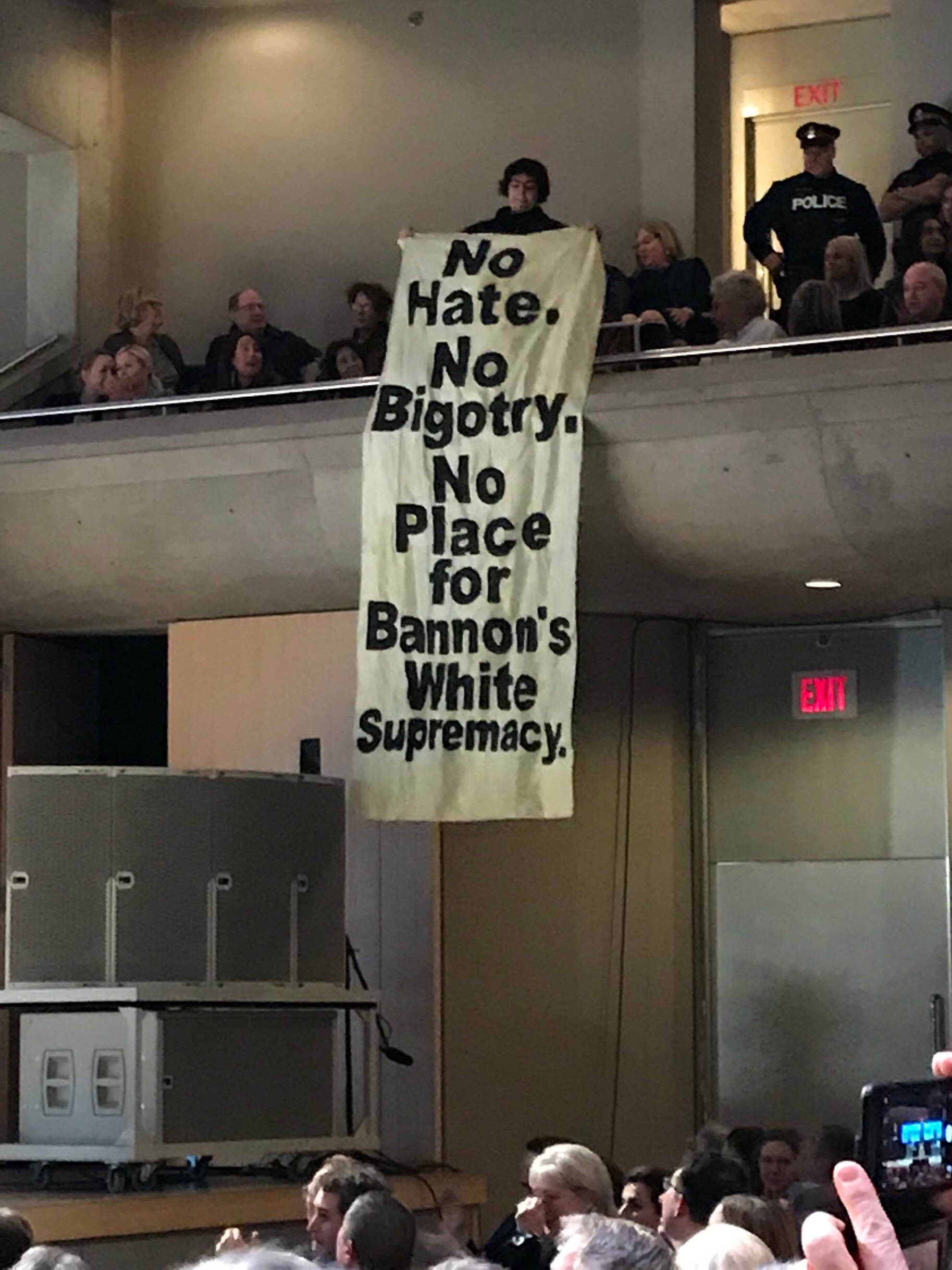
As for Frum, he is a more complicated case. From his perch at Atlantic magazine he has become one of the leading conservative voices denouncing the Trump presidency. On the other hand, Frum also became infamous among liberals and pacifists worldwide thanks to his cheerleading for the 2003 campaign against Saddam Hussein’s Iraq and his work as speechwriter in George W. Bush’s White House. Yet he doesn’t quite fit in as central-casting Republican “establishment” figure in the mould of, say, Reince Priebus or Bill Kristol. Indeed, Frum—who is Jewish, and a native Canadian—was cast into a sort of conservative purdah back in 2010 when his principled instinct to speak his mind about the GOP may have cost him his job at the right-leaning American Enterprise Institute.
As a result, Frum’s involvement presented the protestors with an awkward diversion from the idea that Friday’s event was going to be one big Nazi jamboree. At one point, the protest leader interrupted the repeated slogansof “Shame!” to deliver a miniature dissertation about Frum’s alleged historical crimes—including his creation of the phrase “Axis of evil.” Alas, given that the 20-something protestors in attendance were small children when all this unfolded, the oration had the predictable effect of deflating the protest somewhat, and the ringleader quickly changed the subject.

But for his own part, Frum paid the protestors the compliment of leading off his opening remarks with a nod to their concerns—and, in particular, the question that they’d been asking lined up audience members out on the street: Why are you here?
By way of answer, Frum pointed to the poppy on his lapel—worn to mark Canada’s upcoming Remembrance Day—and declared dramatically: “This is not the first time democracy has faced thugs and crooks and bullies and would-be dictators who seek to build themselves up by tearing others down. This is not the first time that people have [declared] themselves to be ‘the way of the future.’ They were wrong then. They are wrong now.” He even noted the upcoming 80th anniversary of Kristallnacht, explicitly summoning the specter of Nazism. The crowd reacted with strong applause, cutting down any suspicion that tonight would mainly be a celebration of Bannonism.
Populist movements, Frum declared, always begin with people who claim to speak on behalf of “the people.” But in all cases, it turns out their definition of “the people” always excludes certain groups—Jews, blacks, Muslims, immigrants. He pointed to Trump’s claim that he got 52 percent of the vote among “women.” But that statistic is only true if you read in certain assumptions, Frum noted archly. When Trump says women, he means white women.
Frum didn’t call Bannon a Nazi. Far from it. The two debaters were unfailingly respectful in the way they addressed one another. (To my surprise, Frum even called the alt-right Breitbart News, on whose corporate board Bannon once sat, an “urgent force” in American politics.) Nevertheless, he scathingly echoed the protestors’ claim that Bannon headed up the back office for xenophobes and haters who truly were on the wrong side of history. That brand of populism, Frum said, “does not care about you. It does not respect you…It is anger and fear.”
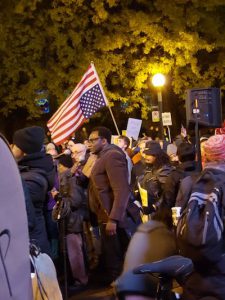
Bannon’s view was that Frum had completely misunderstood the nature of “populism” (a word that Bannon did not disdain, despite—or, perhaps, because of—its stigma among intellectuals). By Bannon’s definition, populism is all about the little guy taking back power from political and financial elites—”the party of Davos,” he called it—which was putting the U.S. through a process of “managed decline,” and which looked down on the “deplorables” (another term Bannon loves to use) as “racist, nativist xenophobes.” Trump’s economic nationalism, he said, “doesn’t care about your race, your religion, your skin color”—and here he had to pause while the audience rained skeptical boos upon him—”your gender, your sexual preference”—more boos—”It cares if you’re a citizen. And look at the results: the lowest black unemployment in history, and the lowest Hispanic unemployment in history.”
And as he would do repeatedly throughout the evening, Bannon threw the issue back on his opponent, noting (accurately) that the Bush White House in which Frum served, a den of Ivy League elites and former Wall Street barons, bore much of the responsibility for the “crony capitalism” that followers of Donald Trump and Bernie Sanders (whom Bannon name-checked positively at several points) seek to overthrow.
Bannon got rough treatment from the crowd at many points. He told some ridiculous howlers, such as his claim that Trump’s decision to visit Saudi Arabia on his first presidential trip abroad showed that he harboured no animus toward Muslims. But he never became prickly or sour (qualities that undid Michael Eric Dyson and, at times, even Jordan Peterson, in the last Munk Debate), and offered smiles and self-deprecating one-liners at his lowest moments. Like all good, confident debaters, Bannon gave the outward impression that the outcome of the proceedings did not particularly matter to him so long as he was given a fair chance to explain his ideas.
He also surprised his audience by channeling several “populist” themes that could just as easily be embraced by the Sanders left. Referring specifically to J.D. Vance’s 2016 book Hillbilly Elegy, Bannon lamented how free trade had caused the rusting out of broad swathes of the American interior—and noted that these same areas are an almost perfect overlay on the regions where unemployment and opioid addiction are most acute.
I couldn’t say what the protestors would have said to this last point. (I suspect that some of them might have lumped it all in with Bannon’s allegedly white supremacist agenda, since most hillbillies are Caucasians.) But it’s incontestable that Mr. and Mrs. Pizza Box would have agreed with Bannon that America had suffered greatly thanks to the thousands dead and $7-trillion that Washington had spent prosecuting wars in Iraq and Afghanistan—wars that Bannon, not without reason, laid at the feet of Frum’s former White House colleagues.
It is common at debates of this type for both sides to completely talk past one another. And there was some of that here. Bannon, for instance, absolutely refused to take the bait when Frum accused the Trump family and its courtiers of mixing business with politics in all sorts of unwholesome and ethically questionable ways (presumably for the simple reason that such charges are simply unanswerable). Nor could Bannon coherently address the point that populist regimes (such as, say, modern-day Venezuela) tend to run up massive debt and inflation by pursuing short-sighted policies that no responsible economist would countenance. And Bannon just stood there grinning when Frum skewered his populist pretensions by telling a story about the time the two of them worked together on a movie—after which Frum rode home in Bannon’s private limo.
But there was enough real cut and thrust to make it feel like a debate, not just an exchange of slogans and anecdotes. When Bannon claimed that Trump appeals to many black and Hispanic voters, Frum cut him down by asking why, if this were so, do the Republicans try so hard to keep them away from the ballot box. For his part, Bannon parried effectively when Frum took him to task for the dog-whistle anti-semitism that infects low-end conservative media. “They don’t target [George] Soros because he’s Jewish, but because he’s effective,” Bannon countered—adding that he had modeled his own N.G.O.s on Soros’ organization because he admired Soros’ success so much. It’s impossible to know whether this is true, but he certainly didn’t sound like an anti-Semite.
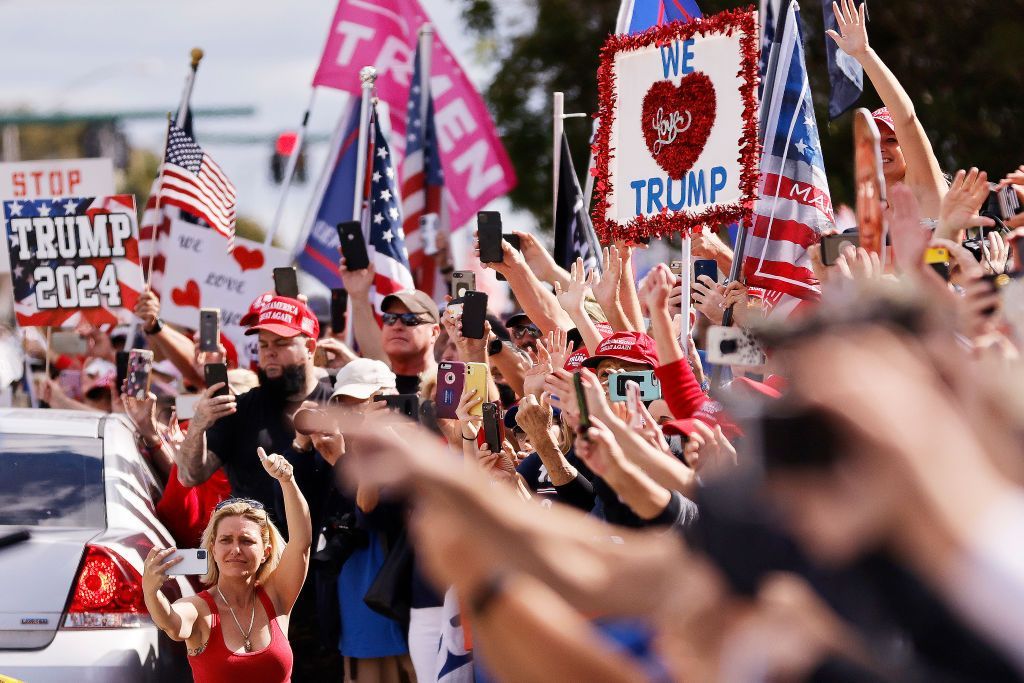
There also was a substantive discussion of trade and military policy, as well as a (somewhat confusing) exchange in regard to who deserves the credit for the economic recovery of the last few years. And Frum showed humility by freely admitting that the Bush and Obama administrations had, like every administration known to history, made all sorts of mistakes—including mistakes that populists had seized upon to bring Trump to power.
But the key difference between principled politicians and rank populists, Frum added—winning over much of the crowd, including me, in the process—is that the former seeks to fix the system, while the latter seeks to destroy it. Trump, he told us, represents those who “are excited by the joy of destruction, wrecking things they could never build, smashing things they do not understand.” And while this was a debate between two conservatives, Frum was there to fight for ideas that principled liberals and conservatives alike treat as sacrosanct—a “state that does not steal, a media that does not lie, courts that respect the rights of all, and voting rights for everybody.”
* * *
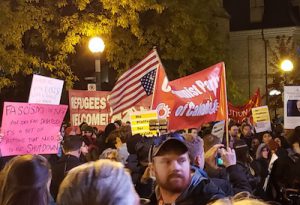
Munk Debate organizers use an electronic system that allows attendees to register their impression of the debaters’ performance, with this data being used to determine whether one side or the other had moved the needle on audience opinion. On Friday night, a gasp went up when it was revealed by Griffiths, at the end of the night, that Bannon had won by a huge margin. Hours later, it was learned that this had been a technical glitch, and in fact the result had been a dead draw. This result was not only expected (these debates rarely change anyone’s mind); but perhaps also quite apt, given the inherently split moral character of populism.
Is populism a polite synonym for xenophobia—or a righteous movement to wrest power from elites? At least since the age of the Gracchi brothers in ancient Rome, it’s always been a mixture of both. Wealth and power accrete to elites in all societies, a phenomenon that naturally catalyzes the creation of needed and well-intentioned political movements that cater to ordinary folk. On the other hand, human beings are tribal creatures, and so it is sadly inevitable that these same movements become contaminated, or even dominated, by demagogues who blame the problems of the poor on conspiracies hatched by outsiders.
This duality is an aspect of populism I had not fully appreciated until watching Bannon and Frum go at it. And I can think of no better rebuke to the protestors who wanted to shut this debate down than to say that I came out of Roy Thomson Hall a better-informed person than when I’d walked in.






